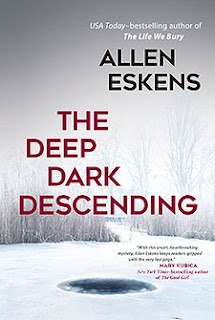Allen Eskens is the author of the new novel The Deep Dark Descending. His other books include The Heavens May Fall and The Guise of Another. He worked as a criminal defense attorney for 25 years, and he lives in Minnesota.
Q: How did you come up with the idea for The Deep Dark
Descending, and how do you think your character Max Rupert has changed over the
course of the novels you’ve written about him?
A: The Deep Dark Descending is the third book in a
three-book arc for the character of Max Rupert. The three books, The Guise of
Another, The Heavens May Fall, and The Deep Dark Descending are stand-alone
novels, but they chart a change in Max Rupert. The Guise of Another is a
good-brother, bad-brother story in which Max is the good brother. He is a man
with a strong moral code.
In The Heavens May Fall, Max is faced with a decision of
whether to follow his conscience or follow the rules. This is the first break
from Max’s Boy-Scout nature, and is the first step in opening the door to his
dark side. This theme, and the title of the novel, comes from an adage “let
justice be done though the heavens may fall.”
The Deep Dark Descending is a revenge novel and is the
logical end of Max’s journey. In this novel, he is struggling with his darkest
nature. It is a novel written to explore whether Max, a man who has had a
strong moral compass his whole life, will follow through on his desire to kill
the man who killed his wife.
This novel also springs from the notion that people find it
easy to say. “If anyone ever hurt my loved one, I would have no problems hitting
the switch on their electric chair. But I wanted to explore that notion up
close, with a character who has to look his victim in the eye and deliberate
the final outcome.
Q: How was the novel's title chosen, and what does it
signify for you?
A: I tend to draw my titles from the themes of my novels. The
Deep Dark Descending represents Max being drawn to his dark side. It also has a
more palpable tie to the novel as one third of the novel takes place on the
surface of a frozen lake on the Minnesota/Canadian border.
Q: Do you usually know how your novels will end before you
start writing them, or do you make many changes along the way?
A: I outline all of my novels and know the endings before I
start to write. But with The Deep Dark Descending, I went back and forth as I
worked my way deeper into that first draft. The book ultimately ended as I had
planned, but I had doubts about it at times.
Q: What are you working on now?
A: I am currently editing The Shadows We Hide, the sequel
for my debut novel, The Life We Bury. It is six years later and there are old
ghosts that need to be dealt with—and some new ones as well.
My protagonist in The Life We Bury, Joe Talbert, never met
his father, although he was named for the man. The Shadows We Hide begins with
Joe learning of a man named Joe Talbert being found dead in southern Minnesota.
Joe goes to that town to figure out if that was his father, and if so what
happened to the man?
Q: Anything else we should know?
--Interview with Deborah Kalb. Here's a previous Q&A with Allen Eskens.




No comments:
Post a Comment